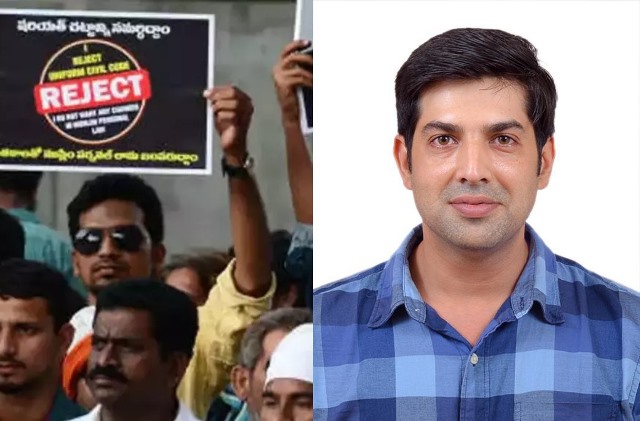
‘Uniform Civil Code Must Initiate a Debate, Not a Knee-jerk Poll Slogan’
Naved Qureshi, a renowned journalist and editor at NMF News, examines various aspects of the call for a Uniform Civil Code and whether it is just an election gimmick. His views:
The concept of a Uniform Civil Code refers to a set of laws that would govern personal matters such as marriage, divorce, inheritance, and adoption for all citizens of India, regardless of their religion or community. Its proponents argue that such a code would promote equality and gender justice by eliminating discriminatory practices embedded in personal laws based on religious customs. For, they believe, such a code is essential to achieving a truly secular and progressive society.
The UCC holds significant importance for any country and society. It aims to establish a balance between personal religious laws and the prevailing laws of the land, regardless of one’s religious affiliation, including Muslims. This balance is essential to ensure equality, justice, and cohesion within a diverse society. The UCC promotes a common set of laws that enable citizens to enjoy equal rights and protections, irrespective of their religious beliefs. By harmonizing personal laws, the UCC contributes to fostering social integration, promoting gender equality, and upholding fundamental human rights, ultimately creating a more inclusive and just society.
However, the UCC has faced staunch opposition from various quarters, and reasonably so. One of the primary concerns is the potential infringement on personal religious laws and practices. India is a diverse, pluralistic society with multiple religions, communities, customs, cultures and sub-cultures, each with its own set of traditions and conventions.
ALSO READ: ‘After Love Jihad, BJP Will Rake Up Uniform Civil Code’
Critics thus argue that imposing a uniform code would violate religious freedom and cultural autonomy, undermining the principles of pluralism that the country cherishes and nourishes. The UCC is also seen as a controversial issue due to historical legacies. The idea of a uniform code was first introduced in the directive principles of the Indian Constitution, which urged the government to “endeavor to secure” its implementation.
However, the framers of the Constitution deliberately kept personal laws out of the purview of the UCC, considering the sensitivities involved. This historical context has created a perception that the UCC is an attempt by the majority Hindu population to impose its values on minority communities, particularly Muslims. The potential impact of the UCC on different sections of society is a topic of intense debate.
Critics argue that the UCC could adversely affect religious minorities, by eroding their cultural identity and subjecting them to the dominance of the majority community. There are concerns about the impact on tribal communities and their customary practices as well. It is essential to ensure that any proposed UCC does not ignore the unique needs and traditions of these marginalized groups.
Supporters of the Uniform Civil Code contend that it would empower women and promote gender equality, as it would seek to eliminate practices such as unilateral divorce, polygamy, and unequal inheritance rights that often adversely affect women in certain communities. They argue that personal laws rooted in religious customs often perpetuate patriarchal norms and deny women their fundamental rights.
The question of whether the current push for a Uniform Civil Code is merely an election gimmick is a subjective one. It is undeniable that the code has been a contentious issue, and politicians have used it to polarize the electorate along religious lines in the past. However, the real intentions behind the current push can only be known to those advocating for it. It is crucial for policymakers to approach the issue with sincerity and engage in a comprehensive and inclusive dialogue with all stakeholders to dispel any perceptions of ulterior motives.
In conclusion, the Uniform Civil Code remains a contentious issue due to concerns about potential infringement on personal religious laws, legacies, and the impact on various sections of society. While proponents argue that it would promote equality and justice, critics fear it could undermine religious freedom and cultural autonomy. It is essential to approach the issue with sensitivity, ensuring that any proposed UCC respects the diverse traditions and customs of different communities. A comprehensive and inclusive dialogue is necessary to address the concerns of all stakeholders and promote genuine secularism and gender justice.
As told to Deepti Sharma

‘Summits Alone Won’t Make India AI Hub; Infra Push, Skill Development Are Key’

‘Flashy Parents & Reel-Crazed Minors Behind The Wheel Are A Curse On Road’

‘Social Media Addiction Is Turning Into A Mental Health Crisis’
